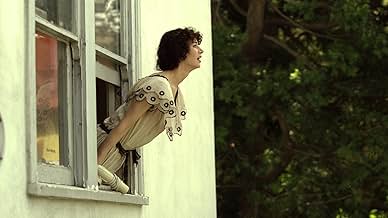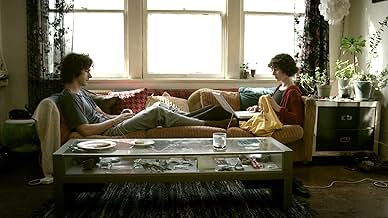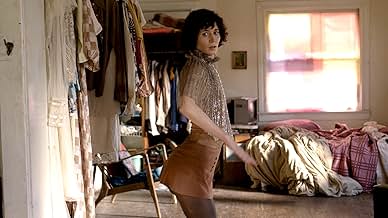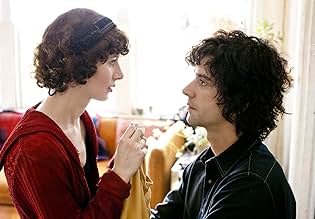Cuando una pareja decide adoptar un gato callejero, su perspectiva de la vida cambia radicalmente, alterando literalmente el curso del tiempo y el espacio y poniendo a prueba su fe el uno en... Leer todoCuando una pareja decide adoptar un gato callejero, su perspectiva de la vida cambia radicalmente, alterando literalmente el curso del tiempo y el espacio y poniendo a prueba su fe el uno en el otro y en ellos mismos.Cuando una pareja decide adoptar un gato callejero, su perspectiva de la vida cambia radicalmente, alterando literalmente el curso del tiempo y el espacio y poniendo a prueba su fe el uno en el otro y en ellos mismos.
- Premios
- 1 premio y 7 nominaciones en total
- Neighbor Woman
- (as Diana Sandoval)
Reseñas destacadas
Although it speaks about a universal topic, there are many hints in the movie that point to our current generation. One for instance: accumulating whatever mundane knowledge on the internet, instead of sitting still and trying to think. So noughties.
I don't want to say more. If you are, let's say, in your mid 30s, urbanite, have studied liberal arts, and still struggle (or even better: wait) to define yourself, please watch this movie. You will find a part of yourself, and part of the answer to your questions.
Heartbreaking, absurd, surrealistic, twee and bizarre at the same time, The Future is a piece of independent cinema that cannot be overlooked just because of the presence of disturbing elements such as the talking cat (whose high-pitched, childish voice rumbling in the dark is a powerful beginning by the way). Miranda July, director, writer and star of the film, is not just "being weird for the sake of being weird", but uses fantastic and bizarre images and situations to talk about our biggest taboos: the frailty of love, the futility of dreams, the anxiety about the passage of time and the fear of death.
With their scruffy curls and their apathetic attitude towards life, Sophie and Jason seem to be the perfect couple. By seeing them lied down on the couch with their feet entangled, the spectator realizes that they felt really comfortable being together. The image of Jason peacefully sleeping over Sophie's chest (sweet for some, twee for others) is also a very faithful representation of true love, as well as Jason's attempt to stop time forever reflects very well how heartbreak feels. Miranda July said in an interview that she intended to describe: "the bittersweet vertigo of true love". Despite the audience does not doubt in the sincerity and profundity of the feelings of the couple, it is forced to see how circumstances and human weakness makes their love begin falling apart.
Firstly, to understand why they (as us ourselves) start panicking when the words "a 5 years commitment" are brought up, it is necessary to come back to the kitten wounded in her paw. Like Paw-Paw, who patiently waits for the couple to start his real life (she's even counting the days), we are always waiting for something good to happen, for the real beginning of our lives. And when we reach the thirties, we start to question ourselves if that beginning is not already gone, get depressed for having wasted the first half of our life and look at the future even more anxiously than before.
This is more or less what happens to Sophie and Jason, whom the idea of looking after a kitten -requiring a total care- for the next five years of their lives, make them think of their (scary) future: "We're 35 now ... by the time the cat dies, we'll be 40 ... and 40 might as well be 50 ... and after that, spare change." "Spare change?" "Less than a dollar-- not enough to get anything you want " Jason's words reflect our anxiety about the passage of time as we cannot help feeling frustrated when the years pass by without us having reached the milestones we set for ourselves. Nonetheless in the film July, who said of life "I rush through it, like I'm being chased", warns us about the dangers that this feeling of "being always late" (late to live?) provokes. The Future not only make us consider how useless is to be always projecting into when it's going to be "better", but also make us question the importance of our lifetime dreams. It kind of helps us to get rid of the endless frustration caused by the contrast between our high expectations and our day-to-day reality. Like Sophie and Jason, everyone suffers from the Cervantine conflict, that is to say, the conflict between the world as we have imagined it and the world as it is. The story of Sophie and Jason somehow questions the futility of dreams, often unattainable and absurd (remembering Jason's: "I always thought I'd be a world leader").
How is it possible we cannot live happily just because we have not achieved some pretentious (generally childish) life goals? The Future, although has not the answer to the question, teaches us to open our eyes to our own limitations and stop feeling as if we deserved something better in life so as to start really enjoying ours. Life is not about waiting things to happen, but making things happen, as July said in No One Belongs Here More Than You: "Don't wait to be sure. Move, move, move"
July says that she intended to describe "the bittersweet vertigo of true love". Here an intense fear (vertigo) is intimately linked to an intense love, as imagining spending a whole life with someone is scary because from the beginning everyone already knows how the story ends, one dying in the arms of the other. Hence marriage makes you inevitably realize your own mortality and finiteness.
Some optimism is hidden, nevertheless, behind the pessimistic tone of the film. No matter what happens we always have to remember the enigmatic words of Joe Putterlik played by Joe Putterlik himself, an eccentric old man who Miranda met in a street market. This old man who participated in the film shortly before dying, tell us with his example that until you are dead, never is too late to live. So remember: "This is just the beginning".
"Life is not about waiting for the storm to pass, it is about learning to dance in the rain"
Anonymous
When I watched the film I regretted having seen the trailer, as it gave away a lot of the key points in the story. I think this is a very good film portraying relationships between couples. I could see a lot of symbols in the film pointing at the gender stereotypes everyone is affected by as being part of a patriarchal society. I like the concept of the cat representing the union of the two people, and how Miranda shows pets in relation to the other couples in the story to show whether or not their relationship survived/withstood time. I think this film provokes thoughts and is meant to make people reflect about their relationships with others. It shows that miscommunication, fear of confrontation, fear of being ourselves, is what breaks relationships. He cannot love her if he doesn't love himself. She cannot love him if she doesn't love herself. We can't have decent relationships when we're not being honest with ourselves. Being honest with another person, loving the other person, comes second to being honest and loving yourself.
I don't understand why this film has so many negative comments in the reviews. I truly enjoyed this and hope to see Miranda continue with more projects.
But I was floored by how good it was. Perhaps due in part to my lower expectations. But I thought it was touching and poignant - and very funny (the whole theater laughed out loud a few times). I cried at the beginning, and I cried (sobbed, really, while having to cover my mouth to mute myself) at the end. I really enjoyed July and Hamish Linklater; especially Linklater, who seemed like a more accessible character while July still bordered on the wide-eyed, "unique" indie-chick stereotype. Though she did break through that enough moments in the film for me to enjoy her character. The cat monologues that I had cringed at when I read about them prior to seeing the film actually worked quite well for me.
I don't think this is a movie I'll re-watch often in The Future, but it's definitely one I think people should see at least once or twice.
The cat only appears physically once at the movie, but it has much more importance than that. In fact, it is the narrator. It helps the audience to be put into context, and it sometimes gives sense to some parts of the film that seem to be incoherent. A part from having an important leading role, it will be the one to break out the whole action; the fact of having decided to adopt it will be the turning point of a story that, at first, seemed to be set in a calm atmosphere.
Some important aspects of life are tackled. For instance, the uncertainty of the future is clearly shown. We have to assume that that is the way it is, we are in control of it, but we are not able to know about it. So, life would not be all about wanting to know more about the future, but to be ready to face what comes next. If we stop to think about the future we do not have enough time to live the present. We spend our daily life worried about the future, and what if that future does not exist?
The entire film is enveloped in an enormous pessimism. The way in which the characters act makes us predict that there is no energy in them and they are likely to lose. Instead of taking into account the advantages that life can offer to them, they only see problems around. They even see the fact of taking care of an abandoned animal as a problem, when that should be taken as a satisfaction. That offers the audience the possibility to decide if that behavior is right for you or not; it is a film that would make people think. Furthermore, it is a movie that favors self-reflection. Although the development of the movie does not make the moral to become evident, one can use the film as the starting point of a personal thought with a clear moral: It does not really matter what will happen next, we have to enjoy the everyday and make the most of it.
¿Sabías que...?
- CuriosidadesThis started life as a performance piece for Miranda July which she expanded into a feature film.
- Citas
Jason: You know how, like in cartoons, when the building gets hit by the wrecking ball, right before the building falls down, there's always like this moment where it's perfectly still right before it collapses? We're in that moment. The wrecking ball has already hit all of this, and this is just the moment before it all falls down.
- ConexionesEdited into 365 days, also known as a Year (2019)
- Banda sonoraSticky Buns
Written by Ryeland Allison
Performed by Ryeland Allison
[Courtesy of Silver Outlet Music America]
Selecciones populares
- How long is The Future?Con tecnología de Alexa
Detalles
Taquilla
- Presupuesto
- 1.000.000 US$ (estimación)
- Recaudación en Estados Unidos y Canadá
- 568.662 US$
- Fin de semana de estreno en EE. UU. y Canadá
- 27.137 US$
- 31 jul 2011
- Recaudación en todo el mundo
- 887.172 US$
- Duración1 hora 31 minutos
- Color
- Mezcla de sonido
- Relación de aspecto
- 1.85 : 1
Contribuir a esta página





































